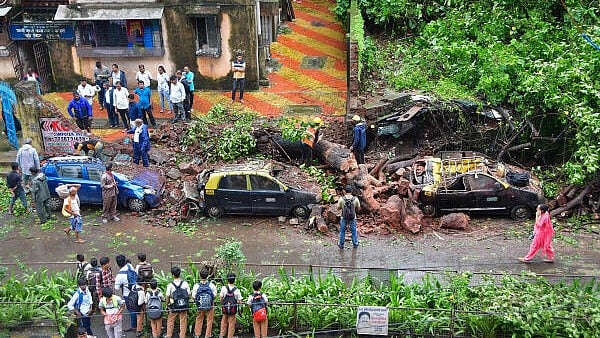
Representative of tree felling.
Credit: PTI Photo
Successive India State Forests Reports (ISFRs), published biennially by the Forest Survey of India, testify to a consistent increase in the country’s overall tree and forest cover. They also reveal another trend: while total green cover is rising, notified forests are shrinking. Dense natural forests are gradually thinning, sending a clear signal that the natural forests are on the path of degradation. The ISFRs reveal that the gains in agroforestry cover wipe out the losses due to natural forest degradation and throw up a positive figure showing a net gain. There is a need to consider how the growth in the agroforestry sector can be further boosted.
The Karnataka (Preservation) of Trees (KPT) Act, 1969, regulates the felling of trees in wooded private lands in the districts of the Western Ghats as well as the urban areas of other districts in the state. In rural areas outside the Western Ghats, the Act allows farmers to cut even valuable species such as teak, rosewood, nandi, mathi, and honne on private lands without prior permission—although a transport permit is still required. This provision was introduced to safeguard these trees in notified forests as well as in other government lands from illicit cutting and removal by miscreants.
Over the past 15 years, restrictions under the KPT Act have been gradually eased with reference to species; nearly 46 species have been removed from the list requiring transport permits. Mango, for instance, was delisted but later reinstated when authorities discovered that large mango trees found along streams in the Western Ghats were disappearing, and there was a surge in mango wood being processed in sawmills. These sawmills and wood industries routinely claimed the wood originated from private lands, with even the stumps removed to erase evidence on the ground for verification.
While felling and transport permits granted under the KPT Act have played havoc in destroying tens of thousands of trees annually on revenue and forest lands in hilly districts of Kodagu, Hassan, Shivamogga and Chikmagluru, the concern of the farmers with regard to the pendency of applications for cutting and transport of the trees owned by them in semi-Malnad and dry regions of the state has engaged the attention of bureaucrats and politicians for the past four or five decades.
In the 1980s, the late Shyam Sunder, then Principal Chief Conservator of Forests, often discussed the matter during field visits. He believed that these restrictions would eventually be removed and warned that farmers should not be subjected to harassment through endless file transfers between departments. It may be difficult to keep track of the file; the farmer often grants power of attorney in favour of a
middleman (timber merchant). In such a situation the farmer hardly gets one third of the market value of the trees. This demotivates the farmer in taking up more agroforestry plantations.
One of the main drivers for the enactment of the KPT Act was the protection of tree growth on revenue and forest lands. Late Shyam Sunder had argued vehemently that government machinery must gear up to protect the biodiversity on all government lands, including notified forests, and for this, the farmers cannot be penalised and harassed. The purpose for which the KPT Act was brought has been fully defeated. Trees on government land have been illegally cut and transported away, with permits on adjoining private lands issued under the KPT Act.
A hilly district like Kodagu, with verdant greens everywhere, has less than 37% of the area as notified forests, providing more scope for plundering. The district has lost all valuable tree species from different tenures of land. Starting from the then Environment Secretary Yellappa Reddy’s 1992-93 report of illegal felling permissions in Kodagu, similar scams have been reported periodically from the district. The Central Empowered Committee of the Supreme Court has also investigated another serious scam of tree cutting in the district in 2008-09. The government did not take any action on any of the reports, and the scams have continued. Two years ago, the deputy conservator of forests of Virajpet was placed under suspension for similar wrongdoing. Monsoon mayhem and landslides in Kodagu and adjoining Wayanad districts in the past few years are the consequences of the plundering of nature.
While enacting a law is vital, it is more important to inflict exemplary punishments on erring officers. If they are prepared to aid and abet a crime, any enactment will remain in the statute book. While time is still not ripe for complete removal of restrictions on transport of timber of valuable species, namely rosewood, nandi, teak, honne, mathi, etc., the State should consider relaxing the movement within dry districts, while the existing provisions for movement of timber to the Western Ghats can continue. If these species are produced on farmlands in Koppal, Raichur, Bijapur, Bagalkote, etc., the farmer must be allowed to transport them in drier regions of the state without any permit. However, the restrictions can be simplified for the semi-Malnad region, and forest officers must protect their own forests. Vigil on sawmills in Western Ghats limits can be stepped up so that they do not accept any timber brought from dry areas without a permit. Kerala farmers notify the felling of trees through an affidavit to the jurisdictional forest ranger, who is at liberty to verify the site within a month, and thereafter, the permission is deemed to have been granted, and the farmer can cut and transport his trees without any permit. This model is another alternative that can be adopted in Karnataka too.
Natural forests are shrinking. The KPT Act must be amended to encourage farmers to expand agroforestry and ensure that the carbon sequestration potential of India’s forest and tree cover is not diminished.
(The writer is a retired Principal Chief Conservator of Forests, Karnataka)